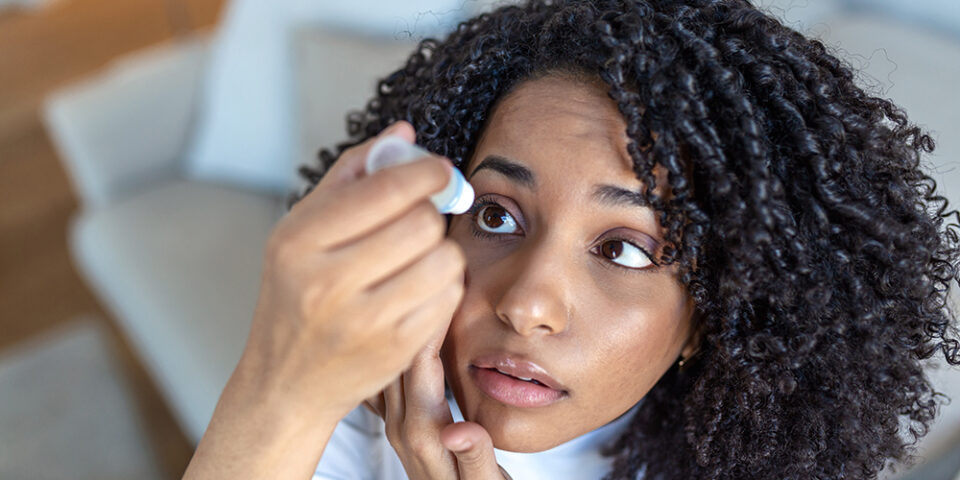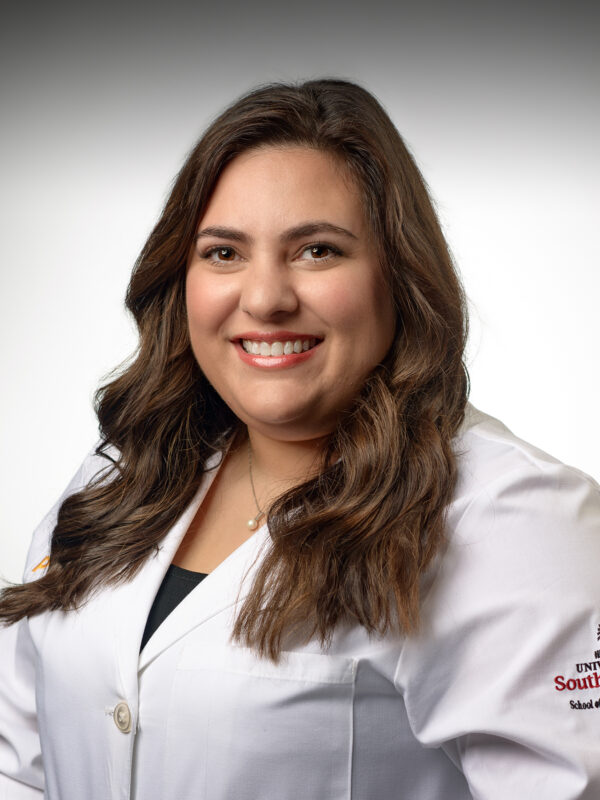Can using eye drops impact your vision?
Using over-the-counter eye drops seems pretty harmless, but knowing the right type of eye drops to use is important. Optometrist Moriah Zuckerman explains what you need to know to keep your eyes healthy.
Transcript
Scott Webb (Host): There are many eyedrops on the market, and knowing which ones are appropriate for us can leave us with more questions than answers. My guest today definitely has the answers. I’m joined today by Dr. Moriah Zuckerman. She’s an optometrist with Prisma Health.
Host: This is Flourish, the podcast brought to you by Prisma Health. I’m Scott Webb. Doctor, thanks so much for your time today. We’re going to talk about eyedrops and I was just mentioning that, you know folks have questions, we think we know what eyedrops are for, what they do, we know probably not to use too many of them at one time, but it’s great to have your expertise today. So, let’s just start here. Do eyedrops help protect our vision?
Dr. Moriah Zuckerman: So, certain eyedrops can help your vision. It just really kind of depends. So, for example, drops that are for glaucoma can help protect your vision by slowing down the disease process. And there’s other drops like dry eyedrops that are really common and they can help protect like the front surface. So in those ways, there are eyedrops that can help protect your vision.
Host: Yeah. And one of the things I usually really turned to, and I don’t have, you know, excessive allergies other than sort of seasonal allergies, but I have these allergy eyedrops that I often use when my allergies are bad because my eyes start itching and then they get watery. So, I tend to use those in the sort of allergy months, if you will. But what other eye problems can eyedrops help with?
Dr. Moriah Zuckerman: So, yeah, allergies is a really good one. It’s a very common one I should say, and so is chronic dry eye syndrome, but they can also help with glaucoma like we mentioned, but also just different inflammatory conditions. There are different inflammatory conditions you can get if you have autoimmune conditions and different things like that. It’ll also help with any eye infections you can get. And there is also another drop that can now help treat presbyopia, which is just, you know, getting a little bit older and needing reading glasses. So, there are drops for that now as well.
Host: Wait, are you saying I wouldn’t need my glasses anymore, that I could just put some drops in and take my glasses off finally?
Dr. Moriah Zuckerman: Well, it depends. It’s really only for certain people and there are side effects with the medicine. But yes, it is a prescription and you can just go to your regular optometrist and ask them about it and they can decide if it’s good for you.
Host: That’s so cool. I love science, technology, medicine. It is just so amazing to me. And, you know, I’ve read the boxes when I’ve bought different eyedrops and, you know, not being an expert, I sort of feel like, “Well, it’s probably not a good idea to use eyedrops every day.” And if you’re using them every day, maybe there’s something else going on. But from your expertise and your experience, is it okay to use them every day?
Dr. Moriah Zuckerman: Yeah, it is. So, I think the first thing is just to make sure you’re using the right kind, and that would just be a discussion that you would have with your doctor and follow their direction on if they want you to use them every day. You know, as long as you’re basically following your doctor’s advice, it is okay to use them every day as long as you’re using the right kind appropriately.
Host: Yeah. Yeah. That’s such good advice. I’ve gotten in the habit of doing that. Or like when I took my cat to the vet the other day and we had been giving her some medicine that we’d had. You know what, rather than me trying to remember or describe what I’m taking or what we’re giving the cat, you know, just bring things with me. And I’ll just bring these drops and say, “Doc, are these okay? Am I allowed to take these every day?” Right?
Dr. Moriah Zuckerman: Yes, exactly. I always love it when my patients physically bring me in the drops or even take photos of their eye, like, “What happened?” Because usually by the time you get to the doctor, things are better. So, I always like it when they bring me in photos too.
Host: Right. It’s like, “I swear they were super red yesterday. But of course, they’re not today,” right?
Dr. Moriah Zuckerman: Right. Exactly.
Host: So, you know, doctor, I know that the sun is not great for us. It may feel good and give us some vitamin D, but it’s not great for our skin. And a different podcast would be about skin cancer and all of that. But generally speaking, is the sun bad for our eyes? And if so, would drops help?
Dr. Moriah Zuckerman: So, the sun, you know, you did mention cancer, the sun can cause different cancers on the eye. About 5-10% of all skin cancers are on like your eyelids. So, you can obviously get skin cancer growing around your eye. The eyedrops don’t help prevent any sort of sun damage, so it is important to always wear sunglasses to protect yourself from the UV light exposure. And you can be exposed to UV light, whether it’s a cloudy day or a sunny day. So, sun protection sunglasses will help protect you from UV light. But UV light can penetrate the eye and cause the lens inside the eye to develop cataracts more quickly, specifically cortical cataracts. And it can also increase your risk of macular degeneration that causes permanent vision loss. And it will also cause premature aging around the eye where it will cause the, skin around the eye to thin out a little bit earlier and enhance your appearance of dark circles and eye bags and wrinkles.
Host: Sure.
Dr. Moriah Zuckerman: And you can even get sunburns on your eye itself. So, it’s always important to do sun protection. But unfortunately, eye drops don’t help with that.
Host: Yeah. So definitely, it’s important to protect our skin, protect our eyes. Unfortunately, the eyedrops, as you say, aren’t going to help. But let’s talk about contacts and eyedrops. I’ve never worn contacts. It seems like a whole sort of laborious thing to me despite how far they’ve come. But let’s just talk about eyedrops and contacts and how those things go together.
Dr. Moriah Zuckerman: So, you can use eyedrops when you are wearing contacts. Eyedrops that say they’re preservative-free, or they’ll say on the box for contacts, they’re safe to use with contacts. Some of the ones I personally like is Opti-Free Puremoist. It’ll say Rewetting Drops. So, Opti-Free also makes a contact lens solution. It’s not the solution, it’s the rewetting drops. The reason why I like that one a lot is that it contains a buffer in it to help prevent protein build up on your contact lenses. And they’re really good for people who wear like a monthly contact or an extended wear contact. But it’s only for soft contacts. So if you are a hard contact lens wearer, a gas permeable contact lens wearer, Blink Drops for contacts are great for both hard and soft, and you can go ahead and put those in and your eyes should feel a lot better when you’re wearing contacts. Or if you’re that uncomfortable, you can always talk to your doctor about switching contact lens brands or materials.
Host: Sure. It does seem like there’s lots of options out there.
Dr. Moriah Zuckerman: There are.
Host: Yeah. Maybe too many, but let’s not get into that, right? So, my experience has only been going to the local Rx and just grabbing, you know, eyedrops that seemed appropriate. Like I said, I take the allergy eyedrops in the allergy months. Generally, you know, what are your thoughts about over-the-counter eyedrops? Are they safe?
Dr. Moriah Zuckerman: So, they are safe, but I wouldn’t say they’re created equally. So for example, there’s three different types of dry eye that people can have. You can be aqueous deficient, evaporative or a mix between the two. And most people are mixed between the two. They’re a combination of both. And all of those eyedrops that you see, that’s really overwhelming when you get to that eyecare aisle at pharmacy. So, you don’t really know what kind, but they are all different. So, some drops are geared more towards different kinds of dry eye than others are geared towards. So, if you don’t know, you know, what kind of dry eye or which ones your doctor recommended for you, you know, my favorites are like Systane Complete and Refresh Digital. And I do stay away from the generics.
So, the issue with the generics is the preservatives in them. So when you go to compare generic versus a name brand drop, the active ingredient will look the same. So, you’ll think it’s fine, but it’s the preservatives that they’re switching around. So, the most common preservative is BAK. And this can cause like nerve damage in the eye. It can cause like delayed wound healing and a lot of people have a toxic reaction and it causes ocular surface issues. So, it actually makes your dryness worse with this preservative. And the name brands, like the drops I just mentioned, they use a different preservative from BAK. But the generics usually like to use BAK as their preservative because it’s cheaper. So, they’re generic, the active ingredients are the same, but the preservative could be BAK, and that can make your dryness worse.
Host: Yeah. It really does seem like when in doubt, rely on the expertise of your doctor. Show them what you’re taking. Take pictures of your eyes, so they can see how maybe your eyes reacted to things. Try to stay away from the generics. It’s been really educational today. I just want to give you a chance as we wrap up here, just sort of overall thoughts about eyedrops and when, how, why all that good stuff.
Dr. Moriah Zuckerman: Yeah. Well, I mean, I love over-the-counter eyedrops. I think it’s great that we have like so many available to us, but it can definitely become overwhelming. So, I think just try to stay away from the generics and ask your doctor which kind specifically and which brand is best for you, because there are so many different eye conditions that they’re geared towards. But they are safe to use every day as long as you’re following your doctor’s instructions.
Host: Well, that’s perfect, doctor. Thanks so much for your time today. You stay well.
Dr. Moriah Zuckerman: Yeah, thank you. You as well.
Host: For more information and other podcasts just like this one, head on over to PrismaHealth.org/Flourish. This has been Flourish, a podcast brought to you by Prisma Health. I’m Scott Webb. Stay well.
Read More
Find a doctor
Whether you’re looking for a primary care physician or need to see a specialist, we’re here to help with experienced, compassionate care near you.
Find a Doctor

